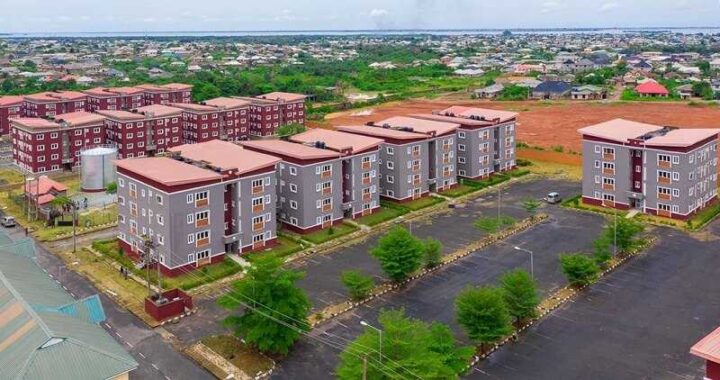A new report on the Lagos housing market has revealed that investors now own over 40 percent of homes across Nigeria’s commercial capital, a trend that experts say is reshaping the dynamics of real estate ownership in the city. The findings, which have sparked debate within the real estate and urban planning communities, highlight growing concerns over access to affordable housing, the dominance of speculative investment, and widening inequality in the housing sector.
The report, compiled by a consortium of property analysts and real estate data firms, indicates that a significant number of residential properties in Lagos are being bought not for personal occupation, but for the purpose of generating rental income or capital appreciation. These investor-owned properties are concentrated in high-end and emerging districts such as Ikoyi, Victoria Island, Lekki, Ajah, and parts of Ikeja and Yaba, where property prices and rental yields are comparatively higher than other parts of the city.

According to the report, properties in some of these areas are appreciating by as much as 10 percent annually, while rental yields in select locations are averaging between 4.5 and 6 percent. The growing attraction of Lagos real estate as a reliable investment hedge against inflation and currency depreciation has seen more investors—both local and foreign—diverting funds into residential property portfolios. This surge in investor activity has been driven by a combination of market confidence, rising rental demand, and limited investment alternatives in Nigeria’s volatile economy.
However, the increase in investor ownership has not translated into broader housing affordability for the average Lagos resident. The city continues to suffer from a severe housing deficit, now estimated at over 3.4 million units. Despite the increase in housing developments across Lagos, the vast majority of these new homes are priced far beyond the reach of middle- and low-income earners. Experts say this investor-driven trend is fueling a housing market that prioritizes profit over social needs, leaving many Lagosians stuck in the rental trap or forced to live in substandard or overcrowded conditions.
The report further notes that fewer than 10 percent of Lagosians can afford to buy a home through outright purchase or mortgage financing. With inflation pushing up the cost of building materials and labour, developers are increasingly focused on high-margin luxury housing, further sidelining the need for affordable units. In some cases, developers build with investors in mind, often pre-selling entire blocks of apartments to real estate investment companies, property speculators, and diaspora-based buyers looking to diversify their portfolios.
Industry analysts warn that if the trend continues unchecked, it could lead to a deepening of social inequality, with a significant portion of Lagos’s population permanently locked out of homeownership. Many workers, including civil servants, teachers, and small business owners, are now spending upwards of 50 percent of their income on rent. A typical one-bedroom apartment in newer areas of Lekki or Ajah, for example, now rents for between ₦1.8 million and ₦2.2 million per year—well beyond the means of the average salary earner.
The situation is further exacerbated by delays in obtaining building permits, high land acquisition costs, and an inefficient titling process, all of which drive up the final cost of housing. Property developers also face infrastructure challenges, such as poor roads, unreliable electricity, and limited drainage systems, which raise the cost of construction and deter affordable housing projects in peri-urban areas.
While the Lagos State Government has made some progress in delivering housing units through public-private partnerships and state-owned schemes, the numbers are still insufficient when compared to the rising demand. Between 2018 and 2024, fewer than 15,000 housing units were delivered under government-supported initiatives, barely scratching the surface of the growing shortfall. Attempts to implement rent-to-own schemes and low-interest mortgages have been slowed by bureaucracy and limited funding.
Experts have called on the government to urgently address the structural issues plaguing the housing sector. Recommendations include incentivizing developers to build low- and middle-income housing through tax breaks, improving land access and titling, streamlining construction approvals, and supporting mortgage institutions with long-term financing options. There are also calls for improved regulation to limit speculative land hoarding and to ensure that residential housing developments serve end-users and not just investors.
Despite these challenges, the Lagos housing market remains attractive to investors due to its sheer size and economic relevance. With an estimated population of over 23 million people and a rapidly expanding middle class, demand for housing—especially rental accommodation—is projected to remain strong. For many investors, Lagos real estate remains one of the most dependable assets in the face of naira devaluation, inflation, and weak returns in other investment sectors.
However, without deliberate efforts to balance investor participation with affordable housing provision, the risk remains that Lagos will become a city where home ownership is the preserve of the wealthy few, while the majority continue to struggle for secure and dignified housing. The latest report serves as a wake-up call to policymakers, developers, and urban planners to rethink current housing strategies and work toward an inclusive housing future that leaves no one behind.
Support InfoStride News' Credible Journalism: Only credible journalism can guarantee a fair, accountable and transparent society, including democracy and government. It involves a lot of efforts and money. We need your support. Click here to Donate
